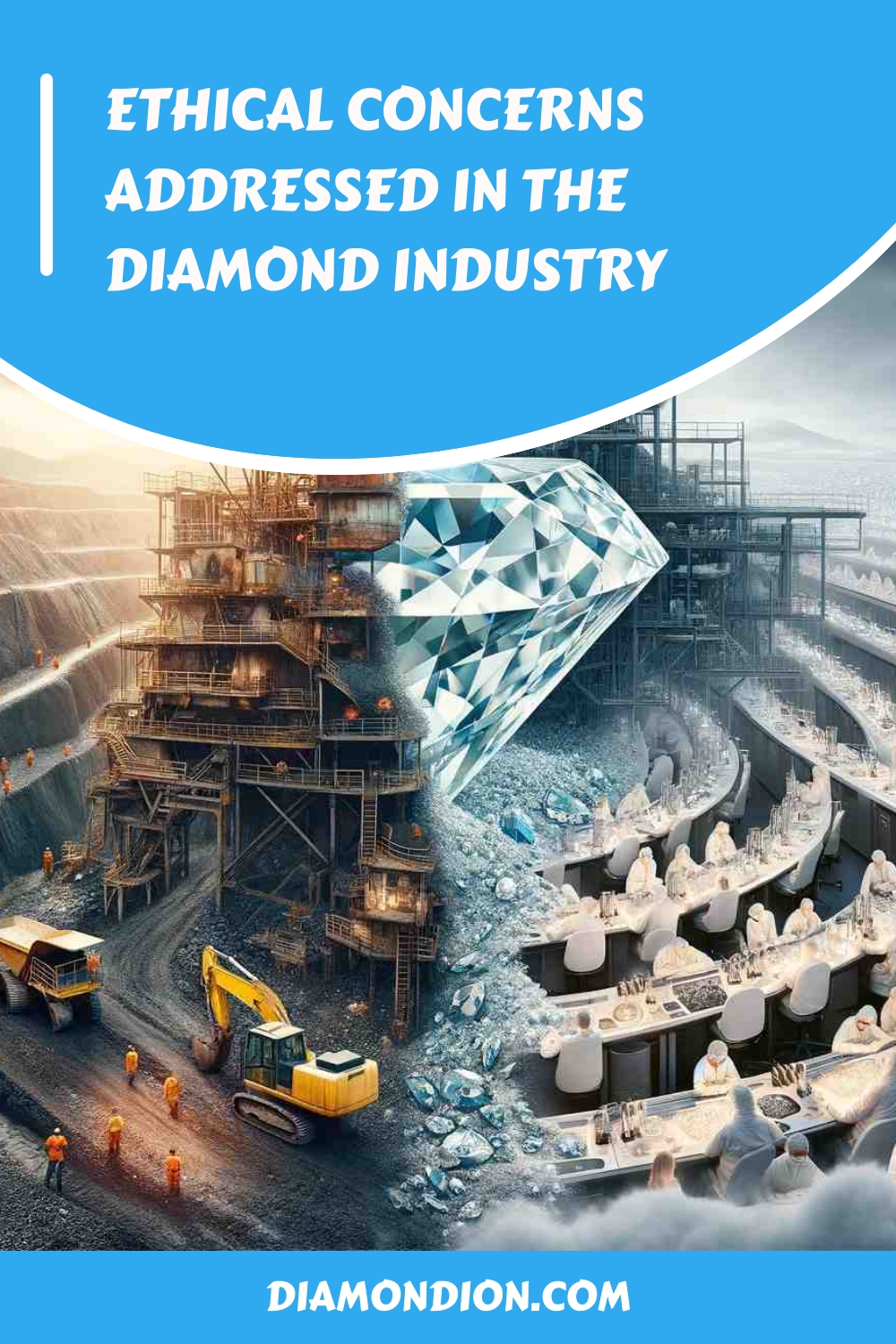Article Contents
- 1 Initiatives for Transparency and Integrity
- 2 The Cost of Diamonds Beyond Carats
- 3 Standards and Certifications for Ethical Sourcing
- 4 Understanding Ethical Sourcing Mechanisms
- 5 The Role of Responsible Mining Practices
- 6 Certification and Traceability in Diamond Sourcing
- 7 Sustainable Mining and Community Welfare
- 8 Addressing the Human Cost of Diamonds
- 9 Consumer Responsibility and Ethical Sourcing
- 10 Procuring Natural Diamonds Ethically
- 11 The Importance of Addressing Ethical Concerns
- 12 All Diamond’s Commitment
The diamond industry has a complicated responsibility to ethically source natural diamonds, which intertwines with global trade and human rights considerations. Diamonds have mesmerized people worldwide, yet conflict and exploitation have often tainted their journey from the mine to the market. Ethical concerns are, quite rightly, a significant concern for consumers of diamond jewellery. This short article examines some of the issues and the way in which the global diamond industry addresses them.
Initiatives for Transparency and Integrity
Initiatives such as the Kimberley Process have been created to bring transparency to this journey and offer integrity assurances to consumers and stakeholders. However, the effectiveness of these initiatives in transforming the sector is still under debate.
The Cost of Diamonds Beyond Carats
When we delve into supply chain certification and the environmental impact of mining practices, we encounter a range of ethical dilemmas. We must carefully consider these issues to understand the true cost of the diamonds’ allure—a cost that is not just measured in carats but also in human dignity and environmental sustainability.
Standards and Certifications for Ethical Sourcing
Ethical sourcing is upheld through standards and certifications from organizations like the Responsible Jewellery Council (RJC) and the World Diamond Council (WDC). The Kimberley Process Certification Scheme (KPCS) is key in stopping the trade of conflict diamonds and upholding the integrity of the diamond supply chain. Environmentally friendly mining practices help lower the industry’s environmental impact and focus on ecosystem restoration after extraction. Ethical sourcing benefits the environment, human rights, and consumer trust, bringing stability and peace to communities that produce diamonds.
Understanding Ethical Sourcing Mechanisms
Understanding ethical sourcing means looking at the mechanisms and standards set by organizations such as the RJC and WDC. These groups ensure the diamond industry adheres to responsible, sustainable, and fair practices. The KPCS is essential in preventing the trade of conflict diamonds and ensuring ethical origins.
The Role of Responsible Mining Practices
Responsible mining practices show a dedication to reducing environmental harm and ensuring fair economic allocation among workers and local communities. Adhering to ethical standards is a moral obligation and a strategic advantage in an industry known for its social and ecological impacts.
Certification and Traceability in Diamond Sourcing
Certified diamonds offer assurance of ethical sourcing through traceability from the mine to the market. Blockchain technology improves this traceability, offering secure, unchangeable records of a diamond’s path. Certifications from independent organizations like the GIA, IGI, or HRD Antwerp guarantee quality and ethical sourcing.
Sustainable Mining and Community Welfare
Environmentally friendly diamond mining focuses on sustainable methods to lessen the industry’s environmental impact and improve the welfare of local communities. Major mining companies adopt measures such as renewable energy use, water conservation through recycling systems, and ecosystem restoration after mining.
Addressing the Human Cost of Diamonds
To understand the human cost of diamonds, we must examine the ethical dilemmas and social repercussions of their extraction and trade. The Kimberley Process Certification Scheme (KPCS) was designed to guarantee conflict-free certification. However, scrutiny has uncovered ongoing problems such as child labour and exploitation in the diamond mining industry. Ethical diamond sourcing requires strict certifications that include human rights and labour conditions. One of the major ethical concerns surrounding the diamond industry is the history of Canadian diamond mining has been tarnished by reports of indigenous rights violations and environmental damage. It is essential for consumers to educate themselves and seek out diamonds that have been ethically sourced and certified to ensure that they are not contributing to these social and environmental issues. By supporting ethical diamond sourcing, individuals can help combat the human cost of diamonds and promote positive change within the industry.
Consumer Responsibility and Ethical Sourcing
To identify ethically sourced diamonds, one must confirm certifications that guarantee responsible mining and labour practices. The KPCS confirms that diamonds are conflict-free, while additional certifications from the RJC and WDC affirm their ethical background. Blockchain technology adds another layer of assurance through unchangeable records.
Customers are urged to ask about the origin of diamonds, understand their characteristics, and ensure their ethical sourcing. This supports fair labour and environmental conservation and promotes stability and peace in diamond-producing areas.
Procuring Natural Diamonds Ethically
Natural diamonds can be ethically procured by following strict international standards that ensure responsible mining and trading. Ethical diamond sourcing entails procurement practices that maintain social fairness, environmental care, and economic sincerity. GIA-certified diamonds are typically acquired in a manner consistent with industry standards designed to ensure ethical buying.
The Importance of Addressing Ethical Concerns
Diamond extraction involves ethical concerns such as labour abuse, environmental damage, and funding conflicts. Addressing these issues is crucial for responsible diamond procurement.
All Diamond’s Commitment
All Diamond prides itself on ethically sourcing natural diamonds to create its exquisite British-designed, handcrafted fine jewellery. Customers can delight in all-natural diamond collections, assured that every piece adheres to the highest ethical sourcing standards.



